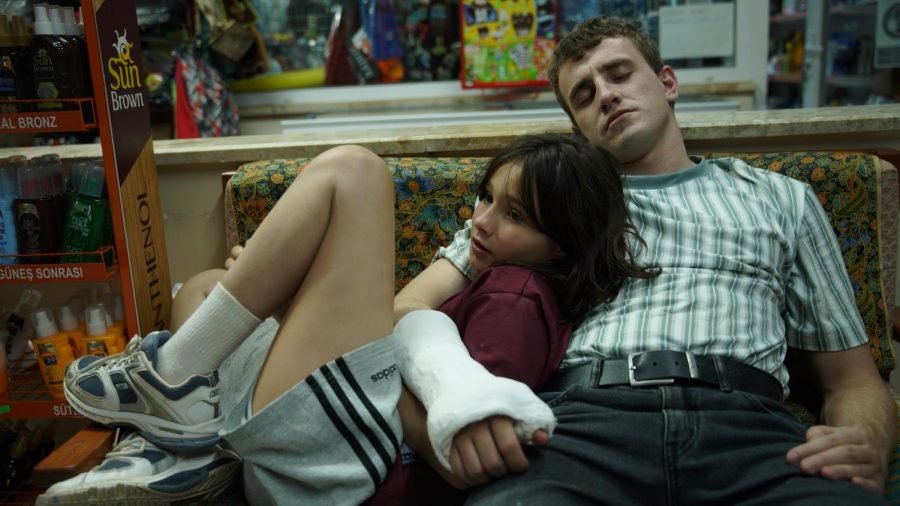‘Aftersun,’ and our parents’ mortality
March 1, 2023
Released this past year by A24 and MUBI, “Aftersun” has been the breakout sleeper hit of this award’s season. Directed by long-time short, but first-time feature-director, Charlotte Wells, “Aftersun” tells the story of a young adult woman recalling a brief, but important, vacation she had with her father as a child.
I found “Aftersun” to be completely riveting, and it’s one of my favorites of the last five years. Conceptually, technically, emotionally and in execution, it perfectly captures the haze of memory, and our longing to remember things that are so far away from us as we grow into who we’re going to be.
Frankie Corio plays 11-year-old Sophie, a young girl who is right in the period of her life where she’s beginning to see the cracks in both what’s going on around her, and in the people in her life.
New-age superstar Paul Mescal plays Calum, a man in his early thirties, and Sophie’s father. It is never explicitly stated, but we are led to assume that Calum is not incredibly involved in Sophie’s life, despite his overbearing love for her. Throughout the film, we’re given mentions of an unnamed mother in Sophie’s life, and the extent of Calum and the mother’s past relationship is left up to interpretation. It’s implied heavily that Sophie spends the majority of her time with her mother.
Mescal received a Best Actor nomination for his effort as Calum, and it is abundantly clear why. He masterfully brings vulnerability and compassion to his portrayal of a father.
In splices, the film is told through the perspective of a video camera that was brought to the trip by Calum. Sophie does the majority of the recording. Videos of Calum, her asking him questions like a news reporter, and sometimes recording the things they do during the trip.
At a point, we get to jump forward to an adult Sophie, and we see that on a sleepless night, she decides to revisit that footage and relive the vacation.
The film is mainly told through the eyes of Sophie. We see Calum how she sees Calum, an idealistic father doing everything to give his daughter the best vacation he can. But she’s beginning to see his struggle. She’s noticing the little things now. How he gives her the big bed, and he sleeps on the sleeping pad. How much he’s falling asleep. How he can’t afford the all-access pass that other people at the resort have.
She’s realizing that he’s human, which is one of the most tragic things any child can learn. It’s something that broke my heart when I realized, and every subsequent time I’ve been reminded.
When Sophie isn’t in the frame, it’s rare that Calum is either. In those instances, their story is told through the work of truly expert cinematography. They’ll be seen through the reflection of a TV screen, or a window, or a mirror and sometimes all of those at the same time.
In those sparing moments where Calum is seen without Sophie, it’s moments of heartbreak. Notably, there is a shot of Calum hunched over bawling. About what is left up to the audience. Maybe a decision he makes later in the film, or perhaps it’s over the crippling weight of parenthood finally catching up to him, especially at such a young age. It’s in these minimal moments without Sophie where he allows himself to break down, so he can be stronger for her. He wants to be amazing for her, he wants to be something he thinks Sophie needs, when all she really needs is him.
Throughout the film there are shots of people dancing in a black void, an invisible dance floor. Sophie and Calum are there, and at a point in the movie we’re shown that this dance floor is quite real, and it was once an important moment for Sophie. But when the dots are connected you realize what we’ve been seeing throughout is Sophie struggling to remember that moment, struggling to fill in the blanks.
At the end of the movie, Calum drops Sophie off at the airport, and he records one last piece of footage as she walks away. And in one of the best final shots of a movie I’ve seen in a long, long time, he closes the camera and walks to a set of doors at the end of a long hallway, and inside those doors is the aforementioned invisible dance floor. Once the video is over, Calum returns to living only in Sophie’s memory. A memory she longs for, and blanks she yearns to fill.

